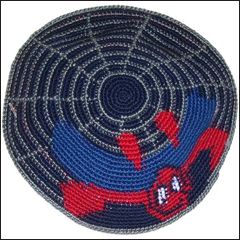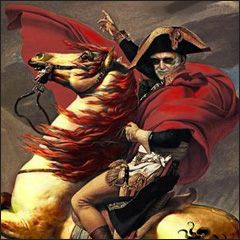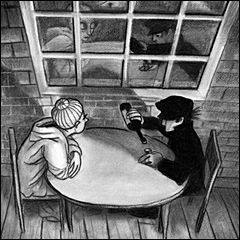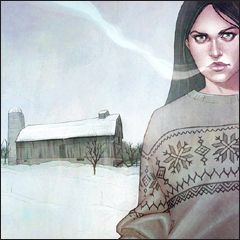Legal | Marvel has sued a Jerusalem retailer for $25,000, claiming the well-known Kippa Man store is infringing on its trademarks by selling unlicensed yarmulkes bearing Spider-Man's likeness. “A reasonable consumer could be fooled into thinking that the infringing product is manufactured and/or sold by the plaintiff with the knowledge and/or approval of the defendant,” Marvel said in its complaint. Kippa Man owner Avi Binyamin notes the yarmulkes are manufactured in China, and that he only sells them. “There are 20 stores on this street, they all sell the same thing,” he told The Jerusalem Post, theorizing that he's being targeted because his store is well known. The Times of Israel characterized the lawsuit as "the first move by Marvel against what it perceives as widespread copyright infringement in Israel, where products featuring its copyrighted superheros are commonly sold." [The Jerusalem Post, The Times of Israel]
Conventions | Heidi MacDonald reports that the mood was upbeat over the weekend at the Small Press Expo, which featured a gathering of lit-comics luminaries — Chris Ware, the Hernandez Brothers, Daniel Clowes — and young upstarts, and in the end seems to have worked out well for all of them: "Indeed a walk around the room on late Sunday discovered nothing but empty tables and happy publishers standing next to piles of money." Indeed, the nearest ATM ran out of cash on Saturday. Beyond that, the panels and the attendees made it clear that we're in a bull market for indy comics right now. [Publishers Weekly]
Conventions | Most conventions start small, but Stan Lee's Comikaze Expo started big and is getting bigger. Liz Ohanesian takes a look at last weekend's event, which suffered some typical growing pains, such as long lines, but also exceeded expectations in terms of attendance. [LA Weekly]
Creators | New Catwoman writer Ann Nocenti explains her take on the DC Comics antiheroine: "I know state-raised people who went from orphanage to foster home, and normally they end up in the prison system. She has that kind of an upbringing but she's empowered. To me, she's kind of an empowerment character. She never steals from the poor -- she steals from the rich -- but she sort of has a natural conscience. She doesn't make that leap to, oh, I should do good things in the world." [USA Today]
Creators | Joe Sacco (Journalism) talks about the challenges of depicting the extreme situations he covers: "Doing [Footnotes in Gaza] in particular is when I realized I didn’t understand how to draw certain things because I didn’t understand the psychology of the moment. It’s easier to understand fear. I can draw fear. I can draw sadism. But an ordinary person doing something like this is a very difficult thing to understand. I’m not going to pretend I understand it. It was easier to hide the face." [The Millions]
Creators | Mark Siegel discusses the inspiration for his new graphic novel Sailor Twain, his unique art style, and the research he did to make the book's historical setting convincing: "At various turns the story drove me into further research, to find out about the headlines at the time, the look of the Hudson at various docking points, lots and lots of that. I spent many hours combing through archives, photos and old maps at the New York Historical Society and the New York Public Library. 1887 is a fascinating time to focus on with its many cross-currents, from the early feminist movement, the seeds of the Civil Rights, the industrial revolution, to the fashions of the day, the arts, the poetry of the times. "Sailor Twain’s" 1887 is a mood, too—a combination of coal smoke, steam power, horse power, fog, rain." [MTV Geek]
Creators | Paul Cornell and Jimmy Broxton chat about Saucer Country #6, a standalone issue, on the latest edition of Kieron Gillen's podcast. [Kieron Gillen's Workblog]
Libraries | "I’m not the only librarian who goes to Comic-Con, but I’m the only Columbia librarian who goes," says Karen Green, who has been building a collection of comics and graphic novels — and related materials, such as Chris Claremont's notes — at the Columbia University Library. [The Wall Street Journal]
Retailing | Rachel Williams, the co-owner of the Utah comics store HeeBeeGeeBeez, built a small business into a four-store chain with a warehouse she claims is "the largest shoppable comic collection in the world." She also brought the store's inventory and sales system from pencils and notebooks to a computer database and point-of-sale system. As a result, sales have increased every year, but this success story has a twist: While all this was going on, Williams decided she was more interested in chemistry, so she is getting a college degree in chemistry—with some help from one of her customers. [Standard-Examiner]
Comics | Dominic Umile looks at the role winter plays in contemporary horror comics: "The inclusion of a wintry, woodsy village can sometimes prove integral to yarns about the supernatural. Snowed-in homes and ice-locked land yield uneasiness and uncertainty, and within a memorable horror story, if low temperatures don’t bring death, they’re almost always the ideal setting for it." [PopMatters]
Graphic novels | Brooke Gladstone of NPR's On the Media fields questions and comments from students and readers about her nonfiction graphic novel The Influencing Machine, which was required reading for incoming freshmen at two colleges. [NHPR]
Advice | Gina Gagliano explains how writers who have no artist and artists who have no writer should submit work to First Second; as always, her post is worth reading because her advice is applicable to other publishers and her hypothetical examples are awesome. [First Second]





